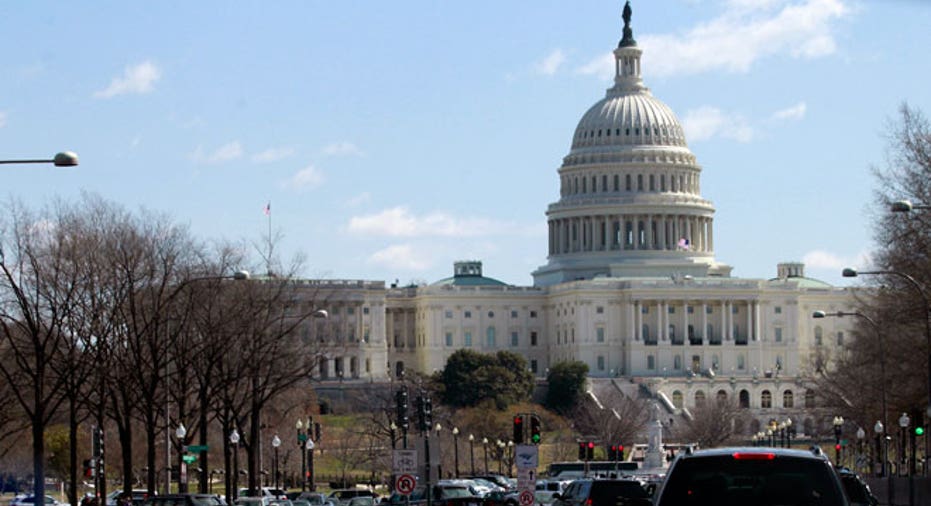Budget Impasses Painful But Proving Effective

The hard truth, as difficult as it may be right now for most Americans to stomach, is that these déjà vu Congressional budget standoffs have actually been successful at cutting government spending and reducing the U.S. deficit.
The current impasse has shut down portions of the government for over two weeks and is threatening an unprecedented default by the U.S. on its debts. A similar impasse in the summer of 2011 led ratings firm Standard & Poor’s to strip the U.S. of its gold-plated AAA credit rating.
There have been others in between, notably the “fiscal cliff” crisis late last year. That one forced the once-unthinkable across-the-board federal budget cuts known as sequestration which took effect earlier this year.
The pattern is well-established by now: early promises of bipartisan negotiations eventually crumble into weeks of weeks of partisan bickering and dueling press conferences held to cast blame on rivals. All as a doomsday deadline approaches and a breathless media reports every twist and turn.
“These episodes are painful and cringe inducing and embarrassing. But the net result is continued fiscal restraint,” said Greg Valliere, chief political strategist at Potomac Research Group in Washington, D.C. “The deficit is in free-fall and nobody realizes it.”
The damage these episodes incur on the U.S. on a global level is hard to quantify but they certainly leave scars. To the rest of the world, the U.S. government looks hapless, unable to govern itself. The current threat of default leaves potential foreign lenders questioning whether the U.S. will pay its debts in a timely manner, a situation that could make it more expensive for the U.S. to borrow money in the future.
Likewise, U.S. businesses and consumers are understandably confused and frightened by the uncertainty that pervades U.S. fiscal policy. Consequently, businesses are afraid to invest, expand and hire, and consumers are afraid to borrow and spend.
And who isn’t tired of the endless political posturing and fingerpointing that passes for action in Washington, D.C.? Congress’ approval ratings have never been lower.
“These episodes are painful and cringe inducing and embarrassing. But the net result is continued fiscal restraint.”
Yet an overriding principle that both Republicans and Democrats agree on, one that has ironically hardened these stalemates because the parties can’t agree on method, is that the U.S. government needs to rein in spending and reduce its debts. Perhaps in spite of itself Congress seems to be achieving that goal.
Numbers Don’t Lie
The numbers don’t lie.
Budget projections forecasted in May by the non-partisan Congressional Budget Office (CBO) estimated that if current tax and spending laws stay the same the U.S. budget deficit will fall to $642 billion in 2013, the smallest since 2008. What’s more, relative to the size of the economy, this year’s deficit -- at 4% of gross domestic product -- will be less than half the size of the shortfall in 2009, when it stood at 10.1% of GDP.
The CBO noted further that revenues for the next two years are expected to rise faster than spending, which will allow the deficit to continue to shrink, hitting 2.1% of GDP by 2015.
That trend is expected to reverse itself later in the decade, however, if Congress can’t agree to long-term entitlement reform that will scale back spending on costly federal health care programs and rising interest payments on federal debt, the CBO warned.
Experts cite several reasons for the current reduction to the deficit, including higher revenues generated for the Treasury by mortgage service companies Fannie Mae and Freddie Mac, as well as higher taxes paid by corporations and individuals. And discretionary government spending has leveled off in many areas and actually decreased elsewhere, the latter caused by the sequestration cuts that hit an array of federal agencies in March.
To cynics (which is to say most Americans these days) any deal reached by Congress that provides a temporary fix to the current budget impasse, one that reopens shuttered government agencies and staves off default, will be scoffed at as more kicking the can down the road. But it was this same kick-the-can-down-the-road approach in 2011 and 2012 that led to sequestration, and like it or not sequestration has cut spending and helped reduced the deficit.
David Kelly, chief global strategist at JPMorgan Funds, said in a note to clients Tuesday that even as the politicians continue to the kick the can down the road, “it is important to recognize that the ‘can’ is getting smaller.”
Kelly recalled that during the debt-ceiling battle in the summer of 2011 the economy was weaker and the budget situation “much more severe.” The budget deficit in fiscal 2011 was 8.4% of GDP, he said, just slightly improved from its peak of 9.8% of GDP reached in fiscal 2009.
In contrast, Kelly provided forecasts that mirror the CBO’s, estimating that the budget deficit in fiscal 2013, which ended on September 30th, was 3.9% of GDP and that it could fall to just 3.4% of GDP in fiscal year 2014.
“Despite the nauseating games being played in Washington, the reality is that grumpy compromises have gone a long way to dealing with the nation’s fiscal problems,” Kelly concluded.



















